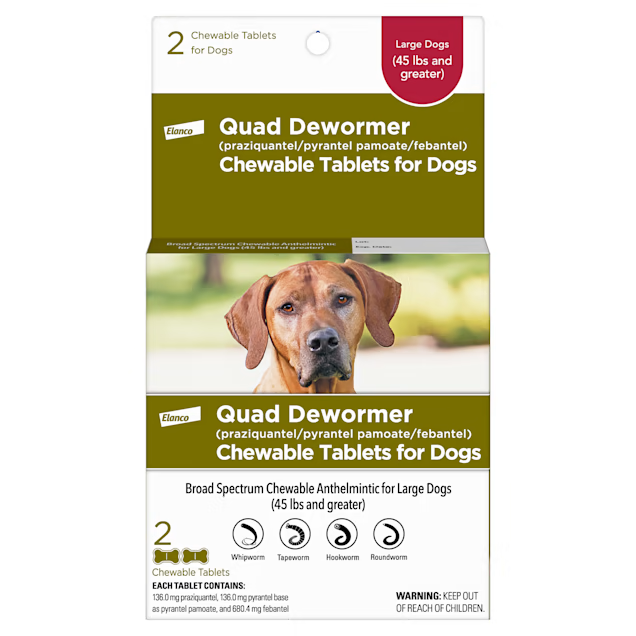As an Amazon Associate I earn from qualifying purchases.
Determining the right amount of wormer for a 110lb dog can be challenging. You want to ensure your pet is both safe and healthy.
Worming is essential for your dog’s health. It helps to eliminate parasites that can cause serious health issues. But, giving the correct dose is crucial. Overdosing can harm your dog, while underdosing might not be effective. In this blog post, we’ll discuss how to determine the proper amount of wormer for a 110lb dog.
We’ll cover factors like age, type of wormer, and specific needs of your dog. This guide will help you make an informed decision to keep your furry friend happy and healthy.
Introduction To Dog Wormers
Worms are a common problem for dogs. These parasites can cause serious health issues. To keep your dog healthy, it’s important to give them wormers. But what exactly are dog wormers? And why are they so crucial?
Importance Of Wormers
Wormers help protect your dog from internal parasites. These parasites can cause weight loss, vomiting, and even death. Regular worming keeps your dog healthy and happy. It also prevents the spread of worms to other pets and humans.
Common Types Of Wormers
There are several types of wormers available. Each type targets different parasites. One common type is the broad-spectrum wormer. This wormer treats a variety of worms. Another type is the heartworm preventive. This wormer protects your dog from heartworms. Both types are important for your dog’s health.
Identifying Worm Infections
Identifying worm infections in your dog is crucial. Worms can cause severe health issues if left untreated. This section will help you recognize the signs. Knowing the symptoms and types of worms is essential for your dog’s well-being.
Symptoms To Watch
Worm infections can show various symptoms. Here are some common signs to look for:
- Weight loss
- Diarrhea
- Vomiting
- Bloated stomach
- Weakness
- Visible worms in stool
- Itchy rear end
If you notice these symptoms, your dog may have a worm infection. Early detection is key to effective treatment.
Common Types Of Worms
Several types of worms can infect dogs. Each type has unique characteristics and health impacts.
| Type of Worm | Characteristics | Health Impact |
|---|---|---|
| Roundworms | Spaghetti-like, found in stool | Can cause digestive issues |
| Hookworms | Small, thin, attach to intestines | Can cause anemia and weakness |
| Tapeworms | Flat, segmented, found in stool | Can cause weight loss |
| Whipworms | Thread-like, found in large intestine | Can cause severe diarrhea |
Understanding these types helps in identifying and treating worm infections effectively.
Weighing Your Dog
Knowing your dog’s weight is crucial for giving the right wormer dose. An accurate weight ensures your dog gets the right treatment. This prevents underdosing or overdosing. It’s a simple process that can save your dog’s health.
Accurate Weight Measurement
Accurate weight measurement is key. First, weigh yourself on a bathroom scale. Note your weight. Next, pick up your dog. Step on the scale again. Subtract your weight from the combined weight. This gives your dog’s weight.
If your dog is too large to carry, use a pet-specific scale. These scales are available at vet clinics or pet stores. They provide a precise measurement. Always ensure your dog is calm during weighing. This helps in getting an accurate reading.
Tools For Weighing
Several tools can help you weigh your dog. Here are the most common ones:
- Bathroom Scale: Useful for small and medium dogs.
- Pet-Specific Scale: Designed for larger dogs.
- Veterinary Scale: Found at vet clinics, highly accurate.
Weigh your dog regularly. Keep track of the weight in a notebook. This helps in monitoring any weight changes. Regular weighing is essential for overall health.

Credit: www.petco.com
Dosage Guidelines For A 110lb Dog
Determining the right wormer dosage for your 110Lb dog is crucial. This ensures effective treatment and the safety of your pet. Below, we outline essential guidelines to help you administer the right dosage.
General Dosage Recommendations
For a dog weighing 110 pounds, the dosage of wormer varies by brand and type. Always refer to the product label. Commonly, the dosage is based on the dog’s weight.
| Wormer Type | Dosage (per 110Lb Dog) |
|---|---|
| Pyrantel Pamoate | 2.5 ml per 10 lb |
| Fenbendazole | 50 mg per kg |
| Ivermectin | 0.1 mg per kg |
Consult your veterinarian for precise dosages. This ensures the treatment is effective and safe for your dog.
Adjustments For Size And Breed
Large breeds may metabolize medications differently than smaller ones. Adjustments might be needed for dogs with specific health issues.
- Labradors: May require slightly higher doses.
- Great Danes: Check for breed-specific sensitivities.
- German Shepherds: Regular dosing is usually sufficient.
Always monitor your dog after giving the wormer. Look for signs of adverse reactions. This includes vomiting, diarrhea, or lethargy. If any of these occur, contact your vet immediately.
Administering The Wormer
Giving your 110lb dog the correct dose of wormer is crucial. You need to ensure your pet stays healthy and parasite-free. Administering the wormer can seem daunting. But with the right methods and tips, it can be a smooth process.
Methods Of Administration
There are several ways to administer wormer to your dog. Here are the most common methods:
- Oral Tablets: These are the most common form. You can give them directly or hide them in food.
- Liquid Form: Liquid wormers can be mixed with your dog’s food or given with a syringe.
- Topical Treatments: These are applied directly to the skin. They are useful for dogs that resist oral medications.
Each method has its pros and cons. Choose the one that suits your dog best.
Tips For Successful Dosage
Giving your dog the right dose is important. Follow these tips to ensure success:
- Read the Label: Always read the instructions on the wormer package.
- Weigh Your Dog: Make sure you know your dog’s exact weight. This ensures you give the correct dose.
- Use Treats: Hide the tablet in a tasty treat. This makes it easier for your dog to swallow.
- Stay Calm: Your dog can sense your stress. Stay calm and patient during the process.
For a 110lb dog, follow these specific dosage instructions:
| Dog Weight | Wormer Dose |
|---|---|
| 110lb | As per package instructions (usually 2-3 tablets or appropriate ml) |
Consult your vet if you are unsure about the dosage. Your vet can provide personalized advice for your dog’s needs.

Credit: www.amazon.com
Potential Side Effects
When administering wormer to your 110lb dog, it’s essential to be aware of potential side effects. Although wormers are generally safe, some dogs may experience adverse reactions. Knowing what to look for can help you manage these effects better.
Common Reactions
Most dogs tolerate wormer well. But some may show mild side effects. Here are common reactions:
- Vomiting: Your dog might vomit after taking the wormer.
- Diarrhea: Loose stools are another possible reaction.
- Lethargy: Your dog may seem tired or less active.
- Loss of Appetite: Some dogs might not want to eat.
These reactions are usually mild and pass quickly. Ensure your dog has access to fresh water and monitor their condition.
When To Contact A Vet
While mild side effects are common, some reactions require immediate veterinary attention. Contact your vet if you observe:
- Severe Vomiting or Diarrhea: Persistent symptoms can lead to dehydration.
- Swelling or Hives: This could indicate an allergic reaction.
- Difficulty Breathing: Labored breathing needs urgent care.
- Severe Lethargy: If your dog can’t stand or move, seek help.
- Seizures: Any sign of seizure activity is an emergency.
Prompt action can prevent complications. Always keep your vet’s contact information handy.
Monitoring your dog after giving wormer is vital. It ensures any side effects are managed effectively.
Natural Alternatives
Many dog owners prefer natural alternatives for worming their pets. Natural remedies can be gentler on your dog’s system. These remedies also avoid chemicals found in traditional wormers.
Herbal Remedies
Herbs have been used for centuries to treat various ailments. They can also help with worms in dogs. Here are some effective herbal remedies:
- Wormwood: Known for its antiparasitic properties. Use in small doses.
- Black Walnut: Effective against intestinal parasites. Be cautious with dosage.
- Cloves: Contains eugenol, which kills parasites. Use ground cloves in food.
Always consult a vet before using herbal remedies. Dosage varies by dog size and weight.
Dietary Adjustments
Dietary adjustments can also help manage and prevent worms in dogs. Consider incorporating these into your dog’s diet:
- Fresh Garlic: Has natural antiparasitic effects. Use in small amounts.
- Pumpkin Seeds: Effective against tapeworms. Crush and mix with food.
- Carrots: Raw, grated carrots help expel worms. Add to meals regularly.
A balanced diet boosts your dog’s immune system. A strong immune system can help fight off parasites naturally.
Remember, natural remedies and dietary changes should complement regular vet check-ups. Always seek professional advice when treating your dog for worms.

Credit: us.amazon.com
Preventing Future Infections
Keeping your 110-pound dog healthy and free from worms is crucial. Preventing future infections is key. Regular check-ups and good hygiene practices can help protect your dog. Here’s how to ensure your furry friend stays worm-free.
Regular Check-ups
Regular vet visits are essential. Take your dog for check-ups at least twice a year. Vets can spot signs of worms early. They may recommend a deworming schedule.
Keep a vaccination record. Ensure all vaccines are up to date. Discuss worm prevention with your vet. They can give the best advice for your dog’s size and health.
Hygiene Practices
Good hygiene can prevent worm infections. Clean your dog’s living area regularly. Dispose of feces promptly to reduce risk.
Wash your hands after handling your dog. This prevents the spread of parasites. Bathe your dog regularly to keep their coat clean. Check for fleas as they can carry worms.
Here are some tips for maintaining hygiene:
- Clean food and water bowls daily.
- Keep your dog’s bedding clean.
- Avoid letting your dog eat feces or garbage.
- Use flea prevention products as advised by your vet.
By following these practices, you can help keep your dog healthy. Regular check-ups and good hygiene are the best defenses against worm infections.
Frequently Asked Questions
How Much Wormer For A 110lb Dog?
For a 110lb dog, follow the dosage instructions on the wormer package. Consult your vet for the exact dosage.
Can I Overdose My 110lb Dog With Wormer?
Yes, overdosing can be harmful. Always follow the recommended dosage and consult your vet for advice.
Is It Safe To Worm A 110lb Dog?
Yes, it is safe to worm a 110lb dog. Use the correct dosage and follow your vet’s guidance.
How Often Should I Worm My 110lb Dog?
Worm your 110lb dog every three months. Consult your vet for a tailored worming schedule based on your dog’s needs.
Conclusion
Giving your dog the right wormer dosage is crucial. Always weigh your dog first. Consult your vet for proper advice. They will guide you to the correct amount. Follow the instructions on the wormer package. This ensures your dog’s safety and health.
Regular check-ups help prevent worm infestations. Keep a record of treatments for future reference. Your furry friend deserves the best care. Stay informed and proactive about their health. With these tips, you can keep your dog happy and worm-free. Happy pet parenting!
As an Amazon Associate, I earn from qualifying purchases.

